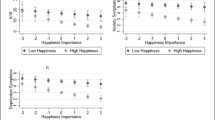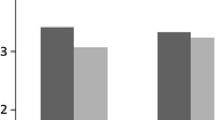Abstract
Purpose: To explore whether self-reported happiness is associated with mental and physical health status among young adults. Methods: Cross-sectional survey of 1257 randomly selected university students in Geneva, Switzerland. The questionnaire included an item that probed the feeling of happiness in the past month, the Short Form-12 health survey (from which mental and physical health scores were computed), scales to measure self-esteem, stress, and social support, reports of various life problems, and socio-demographic information. Results: Most participants felt happy all of the time or most of the time (63%). In multivariate analysis, feeling happy all or most of the time was strongly associated with better mental health (odds ratios for consecutive quartiles of mental health scores: 1.0 (reference), 6.8 (95% confidence interval (CI): 4.5–10.1), 19.2 (95% CI: 12.2–30.2), 39.9 (95% CI: 22.4–71.0)), but also with the feeling of getting enough love and affection (item from the social support scale, odds ratio: 1.9; 95% CI: 1.4–2.7), female sex (odds ratio: 1.5; 95% CI: 1.1–2.1), being Swiss (odds ratio: 1.8; 95% CI: 1.3–2.5), and higher self-esteem (odds ratios for consecutive quartiles ranged from 1.0 to 3.5, 95% CI: 2.1–5.8). The association between happiness and physical health was weak and statistically non-significant. Conclusions: The strong association between happiness and mental health suggests that asking people if they are happy may help identify mental health care needs. Self-reported happiness may also be a useful outcome measure for evaluation of health interventions.
Similar content being viewed by others
References
Graves D. The obsessive pursuit of health and happiness. Br Med J 2000; 321: 1576.
Kozma A, Stones MJ: Predictors of happiness. J Gerontol 1983; 38: 626-628.
Edwards JR, Cooper CL. The impacts of positive psychological states on physical health: Review and theoretical framework. Soc Sci Med 1988; 27: 1447-1459.
Fava GA, Sonino. Psychosomatic medicine: Emerging trends and perspectives. Psychother Psychosom 2000; 69: 184-197.
Veenhoven R. World Database of Happiness, Bibliography of Happiness. Internet site: www.eur.nl/fws/research/happiness, last accessed 18.6.2001.
Myers DG, Diener E. The pursuit of happiness. Sci Am 1996; 274: 54-56.
DeNeve KM, Cooper H. The happy personality: A meta-analysis of 137 personality traits and subjective well-being. Psychol Bull 1998; 124: 197-229.
Cammock T, Joseph S, Lewis CA. Personality correlates of scores on the Depression—Happiness Scale. Psychol Rep 1994; 75: 1649-1650.
Pettijohn TF II, Pettijohn TF. Perceived happiness of college students measured by Maslow's hierarchy of needs. Psychol Rep 1996; 79: 759-762.
Frey BS, Stutzer A. Happiness prospers in democracy. J Happiness Studies 2000; 1: 79-102.
George MS, Ketter TA, Parekh PI, Horwitz B, Herscovitch P, Post RM. Brain activity during transient sadness and happiness in healthy women. Am J Psychiatry 1995; 152: 341-351.
Koivumaa-Honkanen H, Honkanen R, Viinamäki H, Heikkilä K, Kaprio J, Koskenvuo M. Self-reported life satisfaction and 20-year mortality in healthy Finnish adults. Am J Epidemiol 2000; 15: 983-991.
Berwick DM, Murphy JM, Goldman PA, Ware JE, Barsky AJ, Weinstein MC. Performance of a five-item mental health screening test. Med Care 1991; 29: 169-176.
McDowell I, Praught E. On the measurement of happiness. An examination of the Bradburn scale in the Canada Health Survey. Am J Epidemiol 1982; 116: 949-958.
Bradburn N. The Structure of Psychological Well-Being. Chicago: Adline, 1995.
Walsh J, Joseph S, Lewis CA. Internal reliability and convergent validity of the Depression—Happiness Scale with the General Health Questionnaire in an employed adult sample. Psychol Rep 1995; 76: 137-138.
Saracci R. The world health organisation needs to reconsider its definition of health. Br Med J 1997; 314: 1409.
Ware JE, Sherbourne CD. The MOS 36-Item Short-Form Health Survey (SF-36): I. Conceptual framework and item selection. Med Care 1992; 30: 473-483.
Ware J, Kosinski M, Keller SD. A 12-item Short-Form Health Survey: construction of scales and preliminary tests of reliability and validity. Med Care 1996; 34: 220-233.
Blake RL, McKay DA. A single-item measure of social supports as a predictor of morbidity. J Family Practice 1986; 22: 82-84.
Frank SH, Zyzanski SJ. Stress in the clinical setting: The Brief Encounter Psychosocial Instrument. J Family Practice 1988; 26: 533-539.
Pearlin LI, Schooler C. The structure of coping. J Health Soc Behav 1978; 19: 2-20.
Broadhead WE, Gehlbach SH, de Gruy FV, Kaplan BH. The Duke-UNC functional social support questionnaire: Measurement of social support in family medicine patients. Med Care 1988; 27: 709-723.
Bovier PA, Chamot E, Perneger TV. Brief scales for measurement of functional social support and psychological resources in French speaking adults. Soz Praventivmed 2002; 47: 298-306.
Grichting WL. Domain, scope, and degree of happiness. Br J Soc Psychol 1983; 22: 247-260.
Fordyce MW. A review of research on the happiness measures: A sixty second index of happiness and mental health. Soc Indicators Res 1988; 20: 355-381.
Streiner DL. Norman GR. Health Measurement Scales. A Practical Guide to their Development and Use. Oxford: Oxford University Press, 1989.
Kozma A, Stones MJ. The measurement of happiness: development of the Memorial University of Newfoundland Scale of Happiness. J Gerontol 1980; 35: 906-912.
Stones MJ, Kozma A, Hirdes J, Gold D, Arbuckle T, Kolopack P. Short Happiness and Affect Research Protocol (SHARP). Soc Indicators Res 1996; 37: 75-91.
Diener E, Sandvik E, Pavot W, Gallagher D. Response artifacts in the subjective well-being. Soc Indicators Res 1991; 24: 35-56.
Shin DC, Johnson DM. Avowed happiness as an overall assessment of the quality of life. Soc Indicators Res 1978; 5: 475-492.
Diener E, Suh EM, Lucas RE, Smith HL. Subjective well-being: Three decades of progress. Psychol Bull 1999; 125: 276-301.
Veenhoven R. Is happiness relative? Soc Indicators Res 1991; 24: 1-34.
Author information
Authors and Affiliations
Rights and permissions
About this article
Cite this article
Perneger, T.V., Hudelson, P.M. & Bovier, P.A. Health and happiness in young Swiss adults. Qual Life Res 13, 171–178 (2004). https://doi.org/10.1023/B:QURE.0000015314.97546.60
Issue Date:
DOI: https://doi.org/10.1023/B:QURE.0000015314.97546.60




